- Home
- Simon Kernick
The Bone Field Page 12
The Bone Field Read online
Page 12
Ramon nodded slowly, knowing he’d struck a nerve. ‘Yeah, I understand you.’
‘So don’t say another word about that shooting to anyone, right?’
‘Right.’
Once again the van fell silent and Ramon stared straight ahead into the darkness. He was tired. It was two a.m., and it was two hours back to London.
Even so, when he got there he knew he was going to have to make a very important phone call.
Day Three
Thursday
Twenty
I forgot to set the alarm, and when I opened my eyes the bedside clock told me it was 7.50 a.m., meaning I’d overslept by close to an hour and a half. When you’re working a murder inquiry the hours are long, particularly in the first few days. It’s eight a.m. in the incident room at the latest, and sometimes you’re not back out until midnight.
I rubbed my eyes and sat up, and it was a good couple of seconds before I remembered what had happened last night. An illegal entry into a potential witness’s house; the discovery of his hanging body; a violent assault by his killers, with me on the wrong end of it; my photo taken by the same killers; and then a frantic escape during which I may or may not have been seen by a neighbour.
It hadn’t exactly been my finest hour. Still, at least it had proved my theory. Bill Morris must have known something about Kitty and Dana’s murders. Unfortunately, I was never going to find out what it was.
The incident had thrown up a lot of questions, none of which I’d spent much time trying to answer when I’d got home last night. Instead, I’d downed the best part of a bottle of wine in an effort to calm down – it worked – before hitting the sack and, unusually for me, sleeping a dreamless sleep.
Now, though, it was time to start thinking. I made up some coffee, and while it was brewing had a quick shower to wake me up. I had a text message from Tina Boyd telling me she was on the 10.30 a.m. flight to Bergerac in France and was hoping to be at Charlotte Curtis’s current address by early afternoon. I texted back, telling her to ask Charlotte if Henry Forbes had had a tattoo of a pentacle on his underarm when she’d known him, and if so, what was the significance of it. Then I put in a call to Olaf.
As the phone rang, I wondered whether Olaf had somehow found out about my visit to Bill Morris’s place the previous night, but if he had he was keeping it quiet.
‘I got your message about Tina,’ he said. He didn’t sound massively pleased.
‘I thought it was the best thing sending her down there, sir. It saves us manpower and having to wade through all the bureaucracy with the French police.’
‘The problem is, she’s not a police officer, Ray. And she’s not exactly fucking stable either if half the stories are anything to go by.’
‘She’s just following up a possible lead, sir. It’s not even as if it’s a major one. I’ve already spoken to Charlotte Curtis and she didn’t want to help us. It might be that Tina has more luck.’
‘OK. Well, if she finds out anything, I want to be the first to know. I’m coming under a lot of pressure on this case. Have you turned up anything else?’
I thought of Bill Morris hanging in his bedroom. ‘Not yet, but I’m working on a lot of leads. Don’t lose me from this case, sir.’
‘I’ll try not to, but it’s being overseen by the commander, so it may be out of my hands.’
‘Then I guess I’d better turn up something fast. I thought I’d go back through the case files at home this morning rather than come in. It’s quieter.’
‘Good idea,’ said Olaf, sounding a little too relieved for my liking.
‘Can I still use Jools to help me, though?’
‘For the moment,’ he said, and ended the call, which didn’t exactly feel like a vote of confidence.
I knew then my days on the case were numbered, so I was going to have to move fast while I still could.
Grabbing a coffee, I sat down at the dining-room table with my laptop, the case files, and my notebook.
We had two very different murders committed by the same people, if the bodies’ burial in the same place was anything to go by. The first was a random abduction, and I remembered what Henry Forbes had said in my one and only interview with him: ‘I know they’d killed before Kitty’. This suggested that he’d had nothing to do with Dana’s murder. Kitty’s, though, had required extensive planning, and Henry had been very much in on it.
Once again I was drawn back to the mystery of Kitty’s disappearance. The facts as we had them simply didn’t add up. Kitty travelled to Thailand with Henry at the end of July 1990. Her passport was checked on the way out from the UK at Heathrow Airport and stamped on the way into Thailand at Bangkok. She and Henry stayed in Phuket for four days and were seen together by a number of witnesses. They then travelled north to the Khao Sok National Park where they stayed for one night and were seen by further witnesses, who also testified that they saw Kitty leave the hotel alone. She was given a lift to Khao Lak on the coast by the hotel’s owner. And that was it, she disappeared. And then suddenly her remains reappeared twenty-six years later six thousand miles away.
So I went through the possible explanations for how she got back to the UK.
One, Kitty leaves Thailand without getting her passport stamped and makes her way back, entering the country illegally without the authorities knowing. Afterwards, she keeps her return secret, manages not to be seen by anyone, even though there’s a huge amount of publicity surrounding her disappearance, and at some point after that is murdered by persons unknown who tell Henry Forbes, who didn’t return to the UK for a month after Kitty went missing, what they’d done and where they’d buried her.
I wrote all this down in the notebook and read it through twice. As a viable theory for explaining what had happened, it made no sense at all. There were at least half a dozen holes in it big enough to drive a truck through.
So what was the alternative?
I sat there staring at the notebook, turning things over in my head, again and again, oblivious to my surroundings, lost in thought.
Then it hit me. Just like that. The most obvious explanation of all.
Kitty Sinn never went to Thailand.
Of course, there were problems with this theory too. Kitty had been seen in Thailand by a number of witnesses. But had they actually seen Kitty? What if she’d been killed before she left the country and Henry had taken someone else in her place? The only way this would have worked, given the publicity surrounding the case, was if the woman he took looked a lot like her. But it was possible. And if this was the case, the theory made perfect sense. It would explain how Kitty ended up buried in the grounds of Medmenham College, and how Henry knew the location.
But who was the woman he was with? And why was Henry involved?
As far as I could see, there was no obvious motive for Henry killing Kitty. According to the background that Jools Hutchings had given me, he came from wealthy stock and didn’t appear to need the money. And with that level of planning it couldn’t have been a crime of passion. So, what?
I got up, poured myself a second cup of coffee, and texted Tina again, requesting that she ask Charlotte Curtis what Kitty’s relationship with Henry had been like and whether they’d seemed like a loving couple. Then I went back to the files.
Henry had told me other people were involved. What could their motive have been? Could there really have been an occult aspect to both murders? But that didn’t explain the level of planning involved in Kitty’s disappearance and eventual death. There had to be another reason why she died. I just needed to find it.
As I drank my coffee, I went back through Sussex police’s original file on Kitty, looking for something that stood out. The file contained a number of UK newspaper clippings from the time. They’d started off as small pieces on the inside pages but had grown in size as the days passed and the mystery of her disappearance grew. For a couple of weeks in August 1990 Kitty had been front-page news, her smiling photo staring out at the world.
I read carefully through each article, and it was one of the last ones that caught my attention. It was from the Sunday Times and dated October 1992, more than two years after Kitty had gone missing. The headline was ‘A Life of Tragedy: Kitty Sinn’s Mother Found Dead’, and it told how Mary Sinn had been found at her home in Oxford, the victim, police believed, of suicide. Apparently bottles of pills and an empty bottle of whisky had been found next to her body and toxicology reports had revealed she’d died of a massive overdose of painkillers.
What piqued my interest was Mary Sinn’s background, and the article gave a lot of detail, concentrating, as the media so often do, on the more tragic elements. And I have to admit, it had been a tragic life. Mary’s father, Edgar, who was the son of the founder of the Merchant Hardware empire – the article’s word, not mine – had been killed in action in World War Two when Mary was only four years old. Her only sibling, Janet, had been killed in a car crash while on holiday in Italy in 1975, aged just thirty-six. Mary and Kitty’s father had divorced after he’d begun an affair with a male family friend, and the couple had been estranged when he’d died nine years later of cancer. By 1990, all Mary had left was her elderly mother Doris, and of course her only child, Kitty.
After Kitty’s disappearance, it seemed that Mary went downhill fast. She’d had a nervous breakdown that had culminated in her trying to burn down the house of her former brother-in-law Robert Sheridan – the man who’d been married to her late sister, Janet – and his family, while heavily inebriated. When Sheridan had confronted her, she’d attacked him with a knife and he and his daughter, Lola, had been forced to barricade themselves in the house until the police arrived. Mary, who must have been a feisty lady, had attacked the arresting officers as well before finally being restrained and taken into custody. Because of her mental state, Mary hadn’t been charged but had been sectioned instead under the Mental Health Act, and had spent six months in a psychiatric hospital before being released. During her incarceration she’d also been diagnosed as suffering from primary progressive multiple sclerosis, the disease’s most virulent form, so it wasn’t a huge surprise when nine months later, and still with no word of her missing daughter, she’d decided to end it all.
No reason was given in the article for Mary Sinn’s arson attack on her former brother-in-law’s home but I was certain it wasn’t random. That kind of thing never is. She was extremely angry with him for some reason, and I wondered what it was.
I was also interested to learn that there was money in the family. I’d heard of the Merchant Hardware Group. When I was growing up they were a big company with shops in most major towns in the UK, and I wondered how many of them the family had owned. In the end, money trumps most other motives as the most popular for murder. So who gained from Kitty’s death? Her uncle, Robert Sheridan? His children?
I needed to find out more about that side of the family so I called Jools in the incident room.
She immediately asked where I was.
‘Working from home.’
‘Nice. Do you think the boss’ll let me do that?’
‘I doubt it, but then you’re more popular down there than I am right now. Have we tracked down Kitty Sinn’s next of kin yet?’
‘I didn’t know it was my job to do that.’
‘She had two cousins and an uncle, a Mr Robert Sheridan. Can you find out what you can about them, then make contact and set up interviews with them individually? I’d like to talk to them about Kitty.’
‘You don’t want much, do you?’ she grunted. ‘What are you doing today?’
‘Getting somewhere. I’ll fill you in later.’
No sooner had I put the phone down than it rang again.
‘Hello Ray,’ said a deep, melodic voice I immediately recognized.
A few years earlier I’d temporarily left Counter Terrorism and joined the Serious and Organized Crime Agency, or Soca, supposedly Britain’s version of the FBI, but in reality a big and slightly confused bureaucracy. I spent two years there and didn’t achieve a lot, if I’m honest, but one of the more impressive people I worked with was Dan Watts. A small, immaculately mannered black man with the build of a welterweight boxer and a strong Christian faith, he had a reputation for patience and calmness under pressure, which were useful traits in the now defunct Soca.
‘Hey Danny Boy,’ I said. ‘Long time no speak.’ And it had been too, which was probably my fault. ‘Where are you these days?’
‘I stayed when we became the NCA.’
‘Still in organized crime then. So, what can I do for you?’
‘It’s not a social call, Ray. I understand you’re part of the investigation into Henry Forbes’s murder. I have a potential lead I’d like to discuss with you. Face to face.’
‘Can you give me a clue?’
‘Not on the phone. But the reason I’m calling you and no one else is I know for a fact you’re not corrupt. Your colleagues may not be either, but right now I don’t know that, and I’m not taking any chances. I’m currently running a very sensitive operation and that’s where this lead came up. You know the Hub Café in Regent’s Park?’
I told him I did.
‘I’ll be out front at one-thirty.’
Twenty-one
Charlotte Curtis stood in her back garden, breathed in the scent of herbs, and felt the warmth of the afternoon sun on her face. It should have been a glorious day. She’d arranged to meet her friend and fellow teacher Veronique for lunch in a new restaurant that had opened in Agen, and it was her weekly art class tonight down the road in Montagu-de-quercy. In between times her plan had been to give Kado a good walk through the valley and beyond. Now Kado was dead; she’d cancelled her lunch, citing a non-existent illness; she had no stomach for attending the art class; and at some point she was going to have to call Lucien and tell him she couldn’t see him tomorrow night as arranged, or for the next few days.
She went back inside and made herself a cup of coffee. The house felt too silent without Kado. He’d been her companion for the whole time since Jacques’ death – always there, so that she never felt completely alone, even in her darkest moments – and she felt a remorseless stab of pain every time she thought of him now. But she wouldn’t let herself cry. Not yet. Not until this terrible situation was over.
As she drank the coffee, Charlotte wondered whether even now she was being watched by her stalker. It made her skin crawl to think that there was no escape from him. She knew a lot of people would wonder why she didn’t just get in her car and drive as far away as possible. But her stalker had shown what he was capable of with Kado. When you see an animal with its throat cut and realize that you could be next, it focuses the mind. Charlotte had never forgotten her brother getting mugged by a group of fourteen- and fifteen-year-old boys in south London when he was a student. Jeff was a big guy, a rugby player who could hold his own in a fight, but when he’d seen the knife one of the kids was carrying he’d frozen and handed over all his money without a fuss. ‘I even asked them not to hurt me,’ he’d said afterwards. ‘A bunch of schoolkids who didn’t even come up to my chest, yet I was absolutely terrified of them.’
And that was what Charlotte felt like now. Terrified and submissive. Even so, she was still hugely curious to find out as much as she could about Henry Forbes and what he was involved in. Her stalker had told her that she’d be asked questions about Kitty, and that was what the detective had done last night. But why was this happening now, more than a quarter of a century on? Charlotte had resisted the temptation to check the internet for more information, knowing the stalker was probably monitoring the sites she was visiting, but the curiosity was now getting too much for her. It was two o’clock, so she sat down in the lounge with her coffee and switched on the TV, keying in the code for the BBC news channel.
Immediately, Kitty’s face, forever trapped in youth, filled the screen, accompanied by the newsreader telling viewers how bones found in the English countryside had now been confir
med as belonging to missing woman Katherine Sinn.
Charlotte gasped in utter shock. How could this be? She’d seen Kitty on the day she and Henry were leaving for Thailand. She’d seen her …
She composed herself and sat back, suddenly conscious that someone could be watching her, and listened intently to the remainder of story.
And as she listened, she thought back to that last time she saw Kitty, on her way to the airport to begin her great adventure to Thailand.
It took a while. Two, maybe three minutes. Maybe even longer. It was hard to tell how long she sat there for.
But when it hit her, it hit her hard. Something from that day. Something that had never felt right but that had got lost in all the years that had followed.
And in that moment Charlotte knew why the stalker had come for her after all this time.
She also knew something else: he was never going to let her live. When all this fuss had died down, he’d get rid of her. She was sure of that.
Which meant she had to make a decision. And fast.
Stay here and die eventually.
Or run.
Twenty-two
The Dark Man was in the car taking him to the airport when Laroux, his French contact, called.
‘We may have a problem,’ said Laroux. ‘Our target is packing her bags. I think she’s planning on leaving, and she looks to be in a hurry.’
The Dark Man hadn’t expected this. He thought he’d cowed her into submission with the killing of her dog. In hindsight, he should have killed her instead, and made it look like an accident. He was good at that. But it wasn’t his call to make.

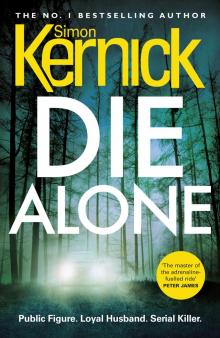 Die Alone
Die Alone Deadline
Deadline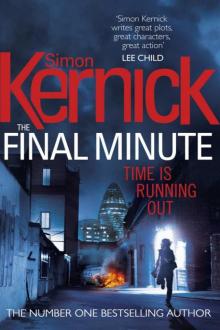 The Final Minute
The Final Minute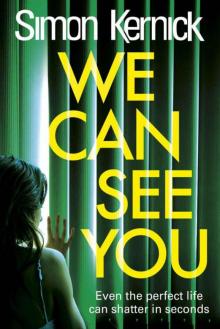 We Can See You
We Can See You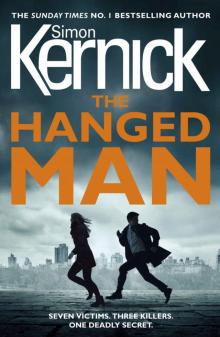 The Hanged Man (Bone Field 2)
The Hanged Man (Bone Field 2)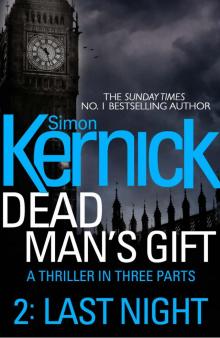 Dead Man's Gift 02 - Last Night
Dead Man's Gift 02 - Last Night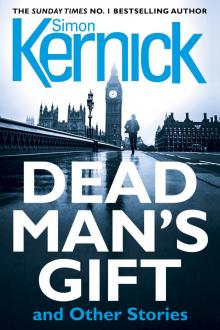 Dead Man's Gift and Other Stories
Dead Man's Gift and Other Stories A Good Day To Die
A Good Day To Die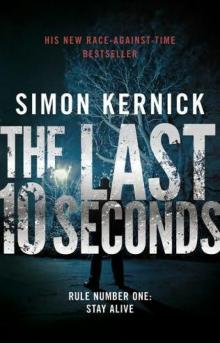 The Last 10 Seconds
The Last 10 Seconds The Murder Exchange
The Murder Exchange The Bone Field
The Bone Field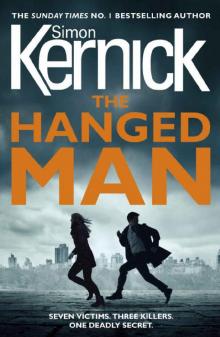 The Hanged Man
The Hanged Man Target
Target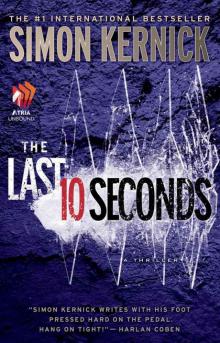 The Last 10 Seconds: A Novel
The Last 10 Seconds: A Novel Relentless: A Novel
Relentless: A Novel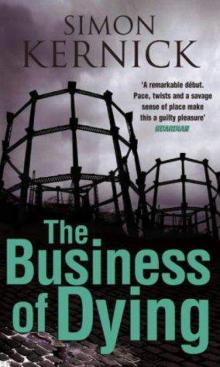 The Business Of Dying
The Business Of Dying Die Twice
Die Twice Flytrap
Flytrap Stay Alive
Stay Alive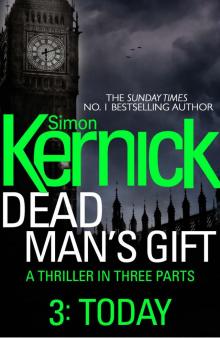 Dead Man's Gift 03 - Today
Dead Man's Gift 03 - Today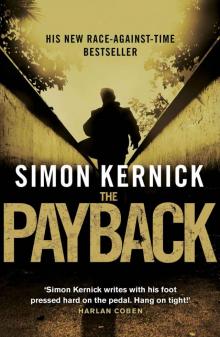 The Payback
The Payback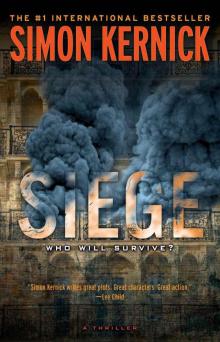 Siege: A Thriller
Siege: A Thriller The Crime Trade
The Crime Trade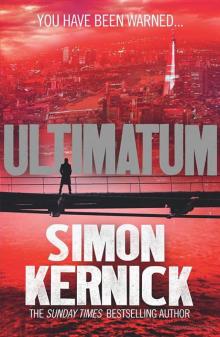 Ultimatum
Ultimatum